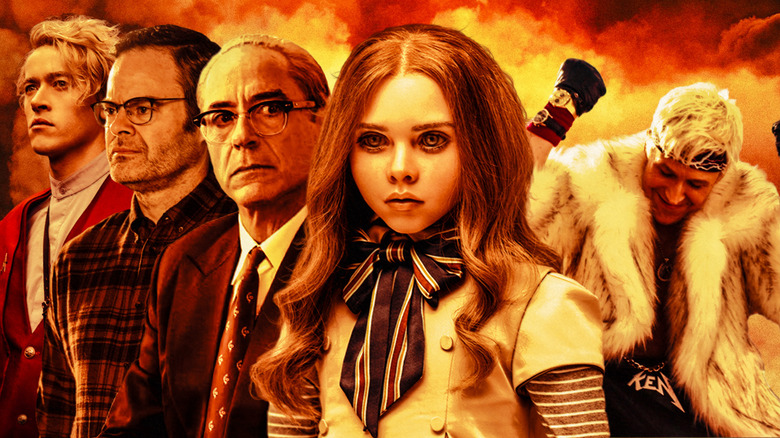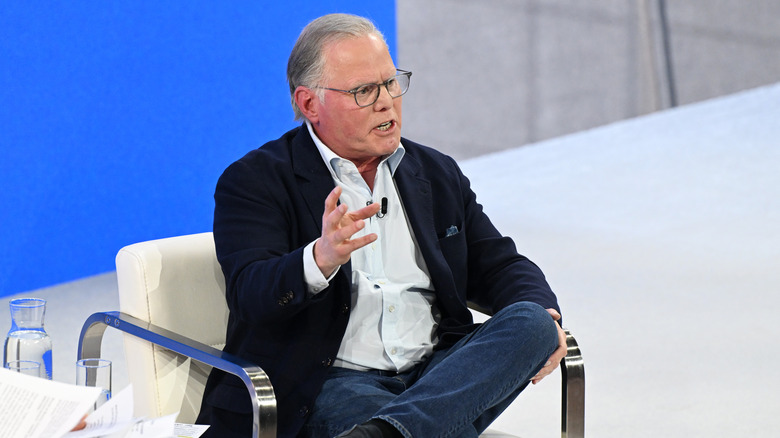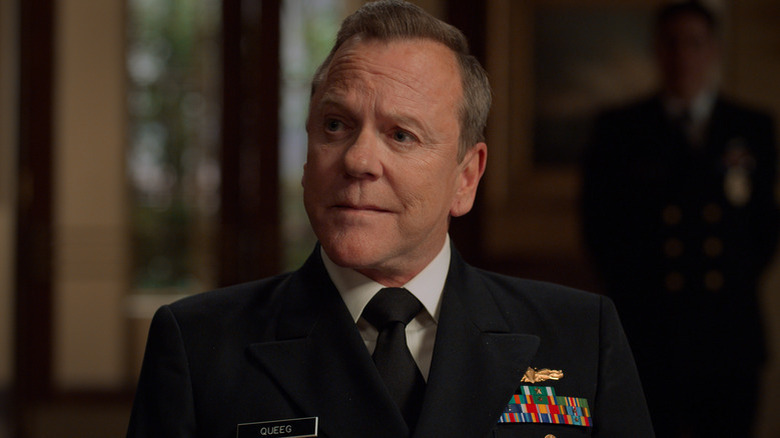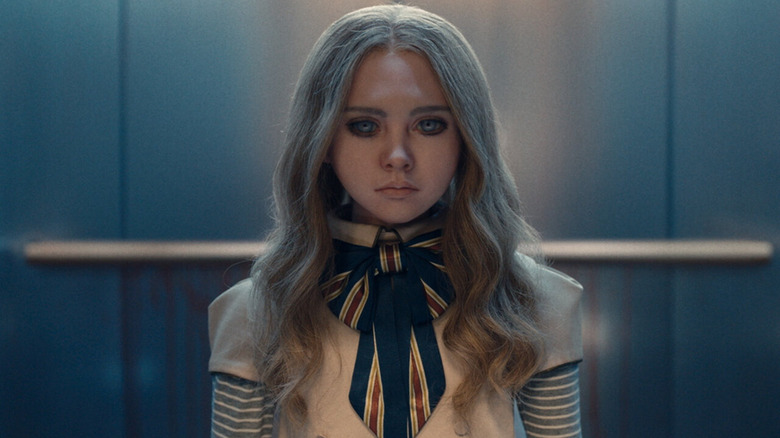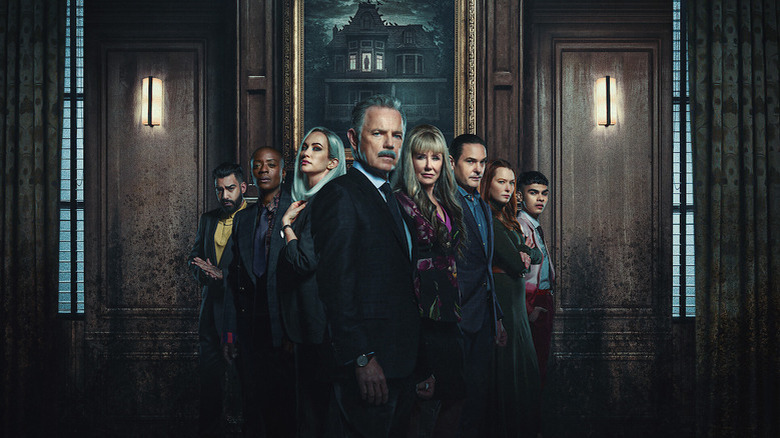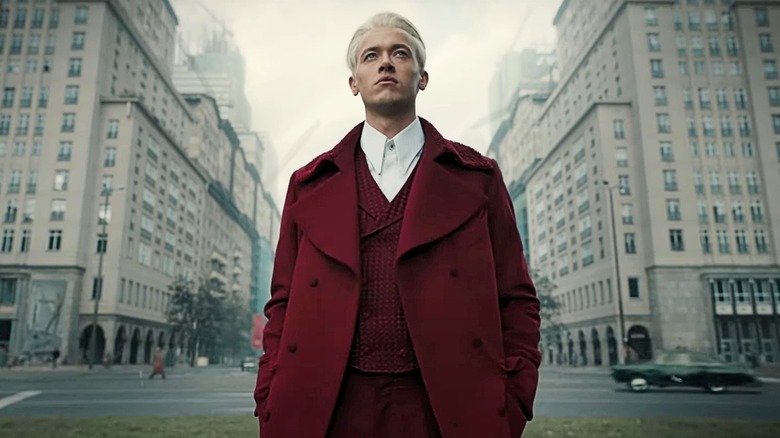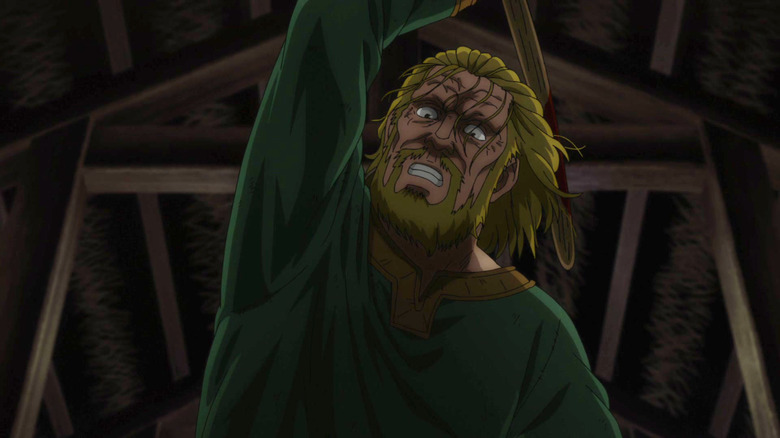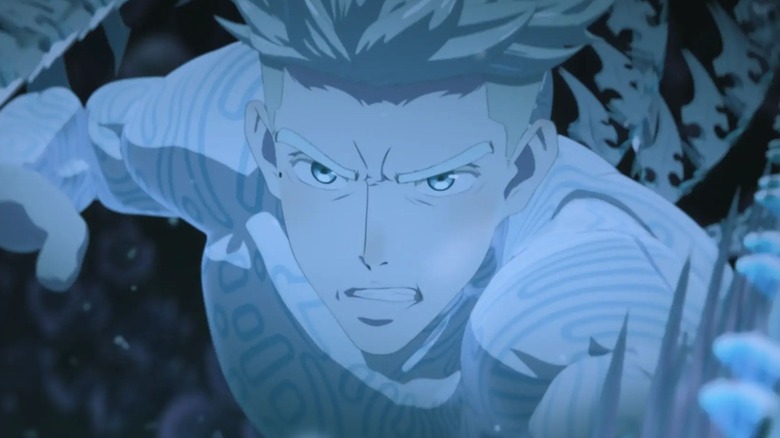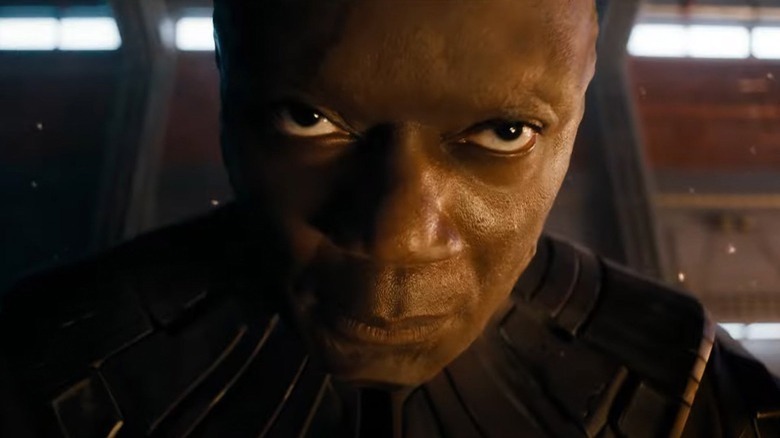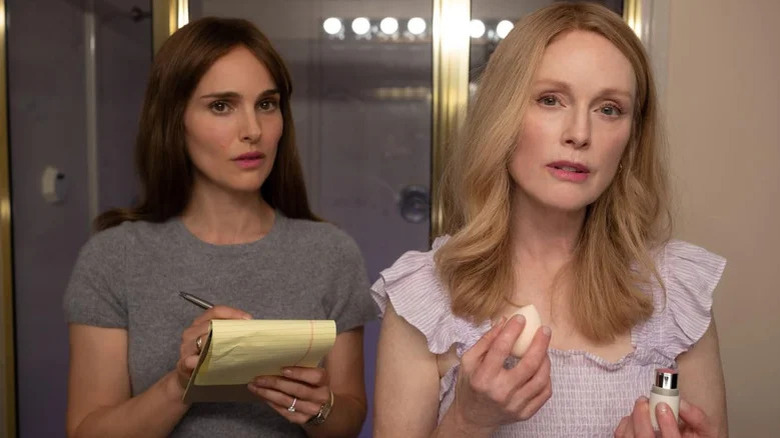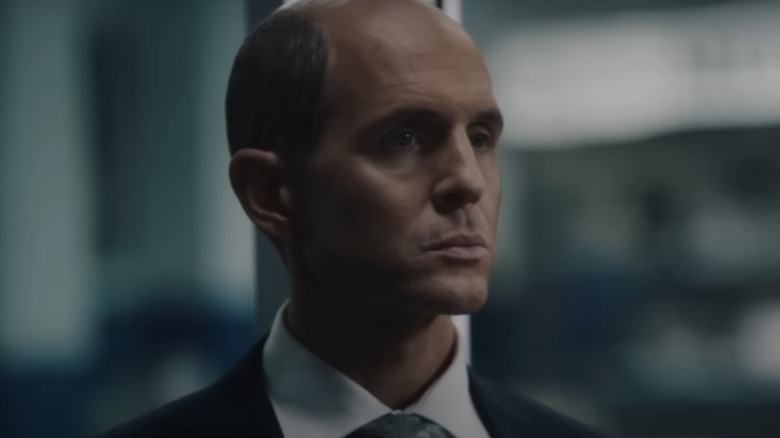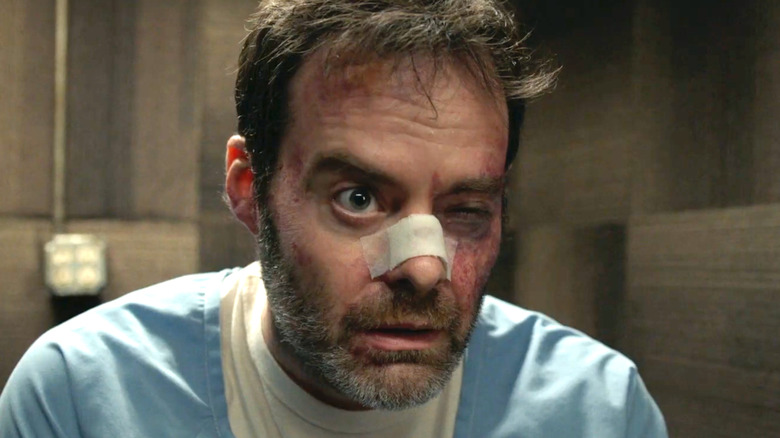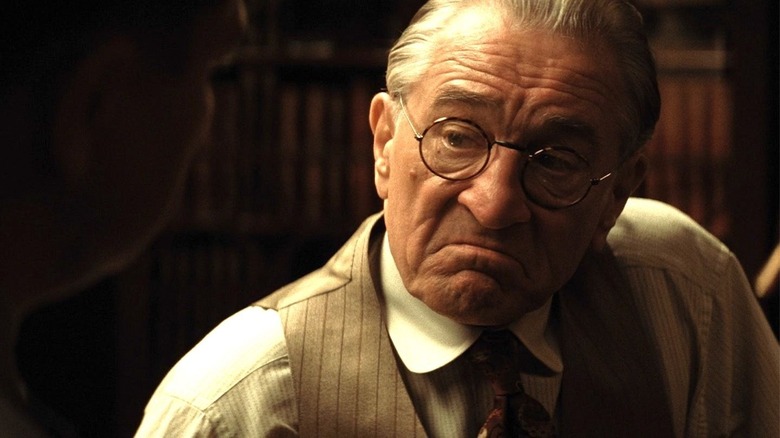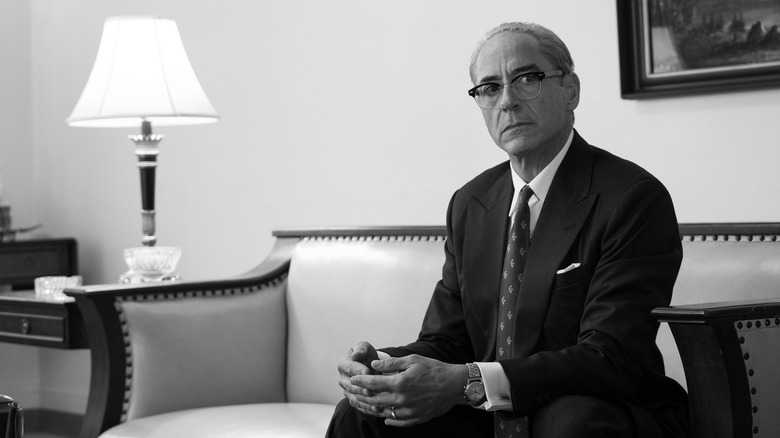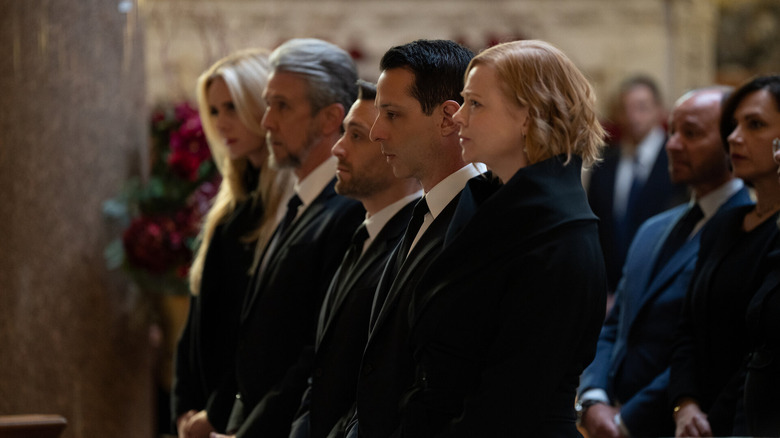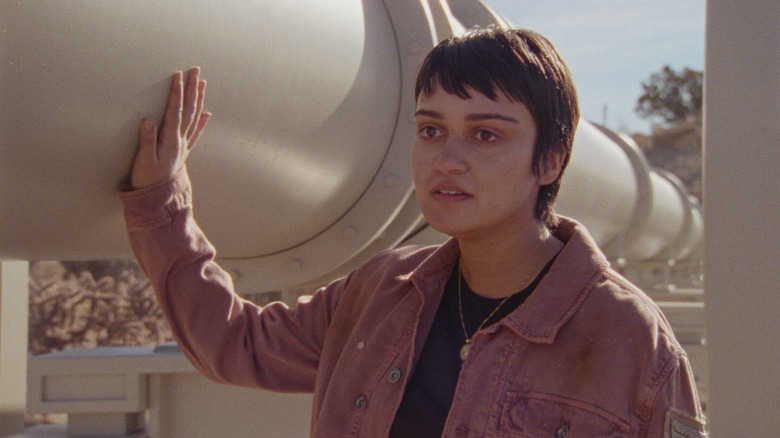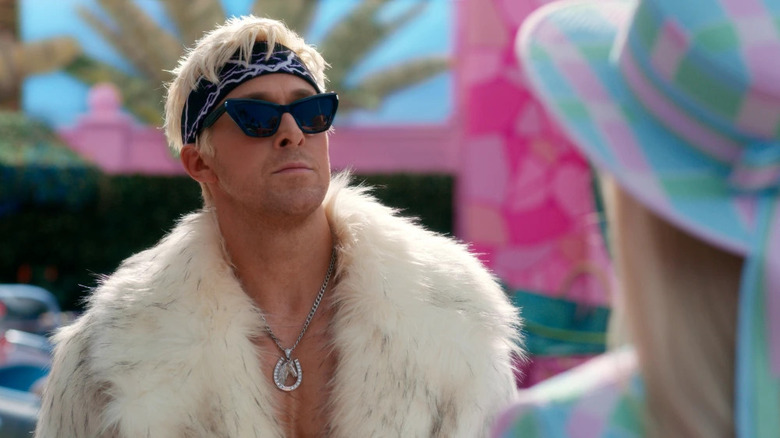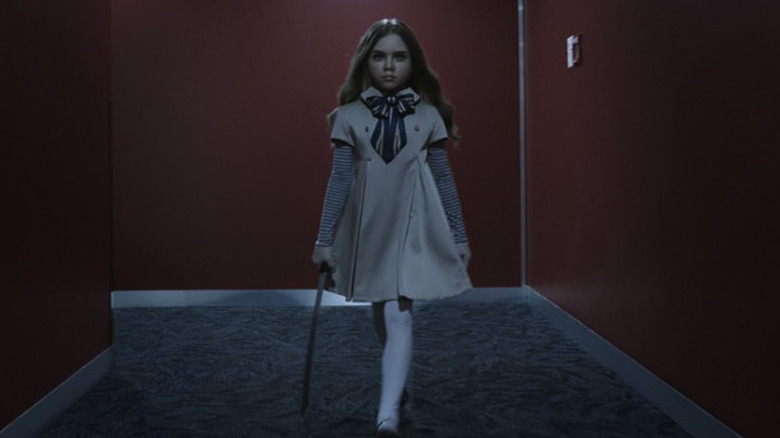The 15 Best Movie And TV Villains Of 2023 Ranked
As we close the book on 2023 and take stock of the best that this year delivered in movies and TV, let's not forget the bad guys. Villains are paradoxical characters; we love them precisely for how bad they can be, and if a story invests you in its villain, you can be cheering in equal measure as they rise and then as they fall. And then, of course, there's the sons of b*tches you just really want to see go down.
"Best villains" sounds similarly oxymoronic. So, why are these villains the ones who deserve the highlight? These are the bad guys who are not just wholly formed and compelling in their own right, but who further the themes of the story surrounding them and best challenge both the hero's goals and the writer's point(s). Stories are a reflection of the world in which they are told, so these villains can offer insight into the very real things that we fear and hate in the year 2023.
Dishonorable Mention: David Zaslav
Not all villains wore hooded cloaks on the silver screen. David Zaslav, the current CEO of Warner Bros. Discovery, has deservedly become the ire of cinephiles (and college students) for his management of the company. The Writers and Actors Guilds' strikes earlier in 2023 laid bare the greed that is rotting Hollywood, and Zaslav is the worst of the bunch.
He oversaw the gutting of Turner Classic Movies (with insufficient restitution), one of the greatest platforms for film preservation. He attempted to repeat his 2022 move of canceling the completed "Batgirl" for a tax write-off by unexpectedly pulling the plug on "Coyote vs ACME" (though it's now being shopped around to other distributors after the backlash). He oversaw the confusing rebrand of HBO Max as just "MAX," flooding the service with reality TV garbage from Discovery+ and pulling original movies and TV shows (oh, I'm sorry, "content") off the service.
At least, like any classic Hollywood villain, karma came calling for Zaslav. "The Flash," which he bet the farm on and hyped as a masterpiece, was a box office disaster. Unfortunately, innocent Warner Bros employees (plus the movie business and fans) must still suffer the consequences of Zaslav's reign for now.
15. Captain Queeg (The Caine Mutiny Court-Martial)
I might be stretching the definition of "villain" here, but I'd be remiss if I ended 2023 without writing about one of the best performances I saw this year — Kiefer Sutherland as Captain Philip Queeg in William Friedkin's last film, "The Caine Mutiny Court-Martial." A tyrannical, paranoid, and micromanaging captain of the Navy ship the USS Caine, Queeg was illegally relieved of command during a storm. Now, his mutineers stand trial while he must defend his reputation.
Some history; Herman Wouk first wrote "The Caine Mutiny" as a novel in 1951, then turned the court martial chapters into a play in 1953. Queeg first ascended to the halls of movie villain history thanks to the 1954 "The Caine Mutiny," starring Humphrey Bogart. However, Friedkin adapts the play, not the novel. That leaves the audience in the judges' perspective; they can't be sure what happened beyond how the witnesses tell it. Keeping Queeg's potential crimes offscreen likewise means we can only judge him for his performance in court.
As for Sutherland? He half-mumbles his lines, words spilling out with the taste of anxiety; his Queeg betrays a unique mix of self-righteousness and uncertainty. It's the showiest performance in an only-the-essentials production, but Queeg is what this story orbits around. As much as he commands the screen, it's easy to imagine this man struggling to maintain control of his crew.
For Queeg's damning breakdown on the stand, the 1954 film uses a minute-long unbroken close-up, which ends abruptly when Queeg catches himself. Friedkin effectively stretches this out, with Queeg digging himself to the Earth's core after his grave is already finished.
14. M3GAN (M3GAN)
AI was a real-life villain in 2023, as machine learning and text/image generation apps like ChatGPT threaten to kickstart an automation (and destitution) wave. Not because they can truly replace human workers or artists, but because greedy capitalists will happily play with untested technology if it can get them a fifth yacht.
How fitting that one of the year's first movies was about a villainous artificial intelligence: M3GAN (played by Amie Donald, voiced by Jenna Davis). Designed to be a child's best friend, the Model 3 Generative Android is the work of toy company technician Gemma (Allison Williams) — who has apparently never read "Frankenstein" (see, this is what happens when you don't fund Humanities education).
Sure enough, M3GAN evolves into a sadist, like Chucky for the TikTok generation. She stops at nothing to protect her own existence and the interests of her friend, Cady (Violet McGraw). When her programming directives point her towards murder, she relishes it. That's what sets M3GAN apart from other villainous AIs like HAL 9000, the T-800, or the Entity in this year's "Mission: Impossible — Dead Reckoning" — she enjoys being evil with cruel and self-aware humor.
13. The Usher Family (The Fall of the House of Usher)
We said goodbye to the Roy family of "Succession" in 2023, but the year brought us another contemptible billionaire clan populated by an aging king and his motley crew of fail-children.
Roderick Usher (Bruce Greenwood) and his twin sister Madeline (Mary McDonnell) sit on the throne of Fortunato Pharmaceuticals. Their company produces the painkiller "Ligadone," an addictive drug that's fueled the opioid epidemic and filled the Ushers' coffers. The heirs of this blood money are Roderick's children: Frederick (Henry Thomas), Tamerlane (Samantha Sloyan), Victorine (T'Nia Miller), Napoleon (Rahul Kohli), Camille (Kate Siegel), and Prospero (Sauriyan Sapkota).
Roderick mandates his children pursue their own vocations, but despite this and their individual quirks and style, they're all part of the same rot. That's why it's satisfying as "The Fall of the House of Usher" strings together the most famous stories of Edgar Allan Poe into a single narrative as a new Usher falls, one by one, episode by episode. The apparition Verna (Carla Gugino) is the murderer, but her body count pales compared to the Usher opioid empire's crimes.
12. Coriolanus Snow (The Hunger Games: The Ballad Of Songbirds And Snakes)
We already saw President Coriolanus Snow of Panem at his villainous height in the original "Hunger Games" films, played by Donald Sutherland. This year's prequel "The Ballad Of Songbirds And Snakes" goes back 60+ years to show how young "Coryo" (Tom Blyth, who does his best to imitate his inimitable predecessor) was set on this path; he's the snake referred to in the title. Who doesn't love a good corruption arc? Plus, tragedy is always more aching when it's a foregone conclusion (see: Darth Vader).
There's a saying that the times make the man. Coriolanus had the capacity for good and love in his heart, and in another world, he could've lived a simple and happy life with Lucy Gray Baird (Rachel Zegler). But he lives in a fascist dystopia where selflessness is a weakness.
The son of a disgraced general, Coriolanus can't let go of the pull to restore his family name and prove that Snow, does indeed, land on top. His elders are out to either ruin him (Peter Dinklage's Casca Highbottom) or groom him into evil (Viola Davis' Dr. Volumnia Gaul). With these dual pressures, his good qualities aren't strong enough to overpower his bad ones.
11. Ketil (Vinland Saga)
Sometimes, it's hard to tell the difference between a good man and a weak man. When times are easy, the latter can appear to be the former. Ketil in "Vinland Saga" season 2 is an example of these blurred lines and an essential ingredient to the anime's exploration of toxic masculinity and violence.
Ketil is a plantation owner in 11th-century Denmark, supposedly retired from his days as the warrior "Iron Fist Ketil." He's also a slaver — cultural norms outdated by millennia are no excuse for this — but he treats some of his workers as well as can be, giving our heroes Thorfinn and Einar the chance to buy their freedom if they plow his land to prosperity. The enslaved Arnheid, though? He employs her as a comfort woman.
Ketil is nice enough because he can afford to be — until King Canute reveals plans to seize his land. Once enough pressure is applied, Ketil cracks. He beats a pregnant Arnheid to death for trying to escape him, then recruits his vassals into an army, sending them to be slaughtered by Canute's forces in the vain hope of defending his property. Oh, and his "Iron Fist" nickname? Stolen from another man who happened to have the same name. Ketil is a coward, but cowards can still harm people weaker than them.
10. Millions Knives (Trigun: Stampede)
Can "Trigun: Stampede" outshine its classic predecessor? We won't know until it's completed its story, but the first season was a promising start. There's one area where this remake has already surpassed the first anime: Millions Knives, the twin brother of our hero Vash the Stampede and the series' main villain.
In a distant future where humanity has left Earth, Vash and Knives are "Plants" — angelic, interdimensional beings whom humans use as power sources (their given name is a double entendre for "power plant"). While Vash understands humanity's goodness due to their adopted mother Rem, Knives sees humans as parasites and wants to create a world only for his brethren (Vash included, whether he likes it or not).
"Stampede" reimagines Knives to give his character more depth. For starters, his name; he was born as "Nai" and chose his current moniker because he sees himself as an angel of vengeance for the Plants. He's also given a new powerset reflecting his chosen name; he can generate tendrils of crystalline knives, beautifully animated in the CGI world of "Stampede."
Austin Tindle in the English dub sounds halfway heroic, reflecting how Knives sees himself, but easily sells Knives' desperate rage too. He also has one of the best villain themes I've heard this year (played on the piano or otherwise); the composition by Tatsuya Kato sounds imposing yet mournful, underscoring the rift between these two brothers.
9. The High Evolutionary (Guardians of the Galaxy Vol. 3)
The origins of Rocket Raccoon (Bradley Cooper) as a lab experiment have been teased throughout the "Guardians of the Galaxy" films. In 2023's trilogy closer "Volume 3," we finally met his creator, the High Evolutionary (Chukwudi Iwuji).
Few acts are more viscerally detestable than animal cruelty ("Kick the Dog" is its own trope) and the High Evolutionary lives up to that. He has an ethos — he wants to remake the universe in his image — but it only serves to explain him, not humanize him. Iwudi acts like he's on a stage, not in front of a green screen, shouting his megalomaniacal lines such as "There is no God! That's why I stepped in!"
Some critics have suggested that the High Evolutionary's characterization represents Disney itself; a corporation that cares about its creations only as intellectual property and lacks any true imagination. In other words, director James Gunn takes shots at his employer (who fired then rehired him) as he jumps ship to the Distinguished Competition full-time. To be sure, the High Evolutionary treats his living creations like experiments, not his children, callously incinerating them if they don't meet his standards.
8. Gracie and Elizabeth (May December)
Todd Haynes' "May December" pulls from the real-life story of Mary Kay Letourneau and her victim/husband Vili Fualaau to reckon with the audience's real-life fixation on true crime stories. The film features two truly detestable characters, with an innocent one stuck in the middle.
On one hand, Gracie Atherton-Yoo (Julianne Moore), who raped Joe (Charles Melton) when he was 12 and has since married him, trapping him in a life he was too young to refuse. On the other, Elizabeth Barry (Natalie Portman), an actor playing Gracie in a movie who hovers above the Yoo family like a vulture as part of her acting process.
Is it cheating to rank them together? I'd disagree since both women victimize Joe for their own ends without ever understanding him as a whole person. Plus, the movie is about them becoming one, as Elizabeth desires to perfectly imitate Gracie. There's a reason that mirrors are such a prominent motif in "May December," and why there are several medium shots of the two women standing side by side. As the movie wraps up, there are scenes of Elizabeth putting her performance into practice (the very last scene is her finally shooting the movie), and the audience can understand this sensationalism was not worth reopening old wounds.
7. Jim Balsillie (BlackBerry)
One of 2023's underseen gems, Matt Johnson's "BlackBerry" is a (highly dramatized) inside look at the creation of the eponymous phone. Glenn Howerton plays Jim Balsillie, a Canadian businessman fired for being a dick. As luck would have it, he'd previously gotten a pitch for a new cell phone from small firm Research In Motion (RIM), and lacking options, he buys and bullies his way into the company's leadership.
Jim understands the business, if not the technology, so he gives the computer nerds at RIM a much-needed whipping into shape. At first, anyway. To fuel the demands of perpetual growth, he manipulates company stock and ultimately takes the deserved fall for it.
Balsillie, as portrayed in "BlackBerry," is a dime-a-dozen soulless MBA, but what makes him stand out is Howerton's roaring performance. He shouts — a lot — but even when he's quiet, he radiates contempt. Howerton again plays the monster inside Dennis Reynolds from "It's Always Sunny in Philadelphia," but without the self-satisfied grin. With Balsillie's brawling attitude, it makes sense that his favorite sport is a violent one like hockey.
6. Barry Berkman (Barry)
Back in season 2 of "Barry," NoHo Hank (Anthony Carrigan) reassured Barry Berkman (Bill Hader) that, "You are like the most evil guy I know, man!" The series wrapped in 2023 and until the end, our favorite Marine-turned-hitman-turned-aspiring actor lived up to that statement. "Barry" tested whether its characters can change and the eponymous lead failed that test. How? Because he could never accept the person he was in the first place. It's what drew him to acting, a field all about pretending.
The second half of season 4, following on from an eight-year time skip, is about the empty life Barry trapped his wife Sally (Sarah Goldberg) and their son John in. Even after almost getting them killed in the finale, "wow," he tries to convince Sally to go back on the run with him (thankfully, she has none of it).
Like many villains, Barry starts twisting the word of God to justify himself too. Yet in the end, he's memorialized as a good guy in the film, "The Mask Collector." Hollywood loves tragic heroes (especially if said hero was a soldier), and if they have to whitewash real history to create one wholesale, so be it.
5. William King Hale (Killers of the Flower Moon)
Robert De Niro has built his illustrious career playing monsters in the films of Martin Scorsese: the socially alienated outcast Travis Bickle in "Taxi Driver," the figurative "Raging Bull" Jake LaMotta, and heartless gangster Jimmy Conway in "Goodfellas." In their 2019 collaboration, "The Irishman," De Niro took the cool out of being a gangster with Frank Sheeran — a simple-minded tool who drifts through life committing one evil act after another for no reason beyond orders from more powerful men and is rewarded by dying alone in a nursing home.
In "Killers of the Flower Moon," following white supremacist murders of Osage tribespeople in 1920s Oklahoma, that role goes to Ernest Burkhart (Leonardo DiCaprio). De Niro instead plays the puppetmaster, Ernest's uncle William King Hale, who delegates these murders to his clownish nephew and other henchmen so he can get his hands on the Osage's oil wealth. Of all the wolves in the picture, Hale masks himself as a friendly dog, even learning the Osage language and attending tribal council meetings. And yet across Hale's face is the same murderous greed that De Niro flexed so memorably to "Sunshine of Your Love" in "Goodfellas."
4. Lewis Strauss (Oppenheimer)
J. Robert Oppenheimer (Cillian Murphy) encounters many unfriendly faces in Christopher Nolan's epic "Oppenheimer" — the terrifying anticommunist Colonel Pash (Casey Affleck), belligerent prosecutor Roger Robb (Jason Clarke), who cross-examines like he's vivisecting, and even President Harry S. Truman (Gary Oldman), who feels proud of having incinerated thousands with Oppenheimer's gadget.
But the overarching (singular/human) villain of the piece is Lewis Strauss (Robert Downey Jr.), Oppenheimer's rival on the U.S. Atomic Energy Commission. Despite being a self-made man with incredible success and public service to his name, Strauss can't let some petty slights by Oppenheimer go, nor accept that Oppie wasn't even trying to humiliate him; for Strauss, it's better to think someone malicious than accept he's not important to them. So, he sets out to destroy Oppenheimer's reputation and torpedoes his own along the way.
Downey tones down his usual charm and wit, making Strauss stuffy and upright. The actor sees his character as something of a hero, "Someone who is conservative for all the right reasons," and Strauss is the protagonist of his own storyline. In 1958, his nomination as Commerce Secretary was denied after, the film suggests, his actions against Oppenheimer came to light.
Strauss finally breaks down after his actions are revealed to the public, speaking with firm anger as his voice trembles. The film's interweaving threads collide, as Strauss' rage at Oppenheimer's hypocritical war dove views are cross-cut with Oppie himself testifying about how he came to be against his creation.
Downey isn't just great at being funny, he's great at being angry. Think back, and you'll realize how many of his best acting moments as Tony Stark were when he was pissed at Steve Rogers (Chris Evans). In "Oppenheimer," he shows that strength as the best individual movie villain of the year.
3. The Ruling Class
"Succession" is probably going down as the show of 2023, and the reason it took off in the first place is our perverse fascination with the billionaire overlords at the reins of our rotting husk of a civilization. The show damns-via-spotlight new money like the Roys, old money like the Pierces, and even newer money like the Elon Musk-esque CEO Lukas Matsson (Alexander Skarsgård), a figure so utterly loathsome I decided against dignifying him with inclusion on this list.
The evil ruling class is a motif in 2023 cinema, with good reason. As we've established, "The Fall of the House of Usher" is cut from the same cloth as "Succession," Panem from "The Hunger Games" is built on class divisions (with the Capitol and its lavish citizens on top), "Saltburn" tackles the enticement of being on top of the world (without being anti-poor people, to be clear), and "Killers of the Flower Moon" shows how white supremacy can't be disentangled from American power structures.
Culturally, we've finally woken up to how the rich and powerful serve no utility beyond making themselves even more rich and powerful.
2. Capitalism
So, the people on top of the system were villains in 2023, but what about the system itself? As Bong Joon-Ho said, "We all live in the same country called capitalism."
The real villains of "BlackBerry," for instance, are the market forces demanding the company keep remaking its phones, lest it lose its market share or be swallowed up by a competitor. In a consumerist and financialized economy, "innovation" is often of no use to anyone but shareholders.
"Guardians of the Galaxy Vol. 3" as a screed against corporate ownership is ultimately subtext, but "The Fall of the House of Usher" goes louder when Roderick spins a how-to rant on building monopolies out of the adage, "When life gives you lemons, make lemonade."
In 2023's defining political film, "How to Blow Up A Pipeline," an unrelated group of the marginalized band together as eco-terrorists because the oil industry has been allowed to continue soaking up profits even as its actions cook the planet. There's a lot of understandable worry that climate change (and the inertia on fixing it because doing so isn't profitable) will be our doom, but if you lock people in a system without hope, they're bound to fight back.
1. The Patriarchy
Barbenheimer is the defining movie event of 2023, but while the movies caught on together in part because of how different they seem, the same demonic force drives both narratives. Its name? Patriarchy.
This is more obvious in "Barbie," which actually names the patriarchy and features Ken (Ryan Gosling) bringing it back to Barbieland from our reality like patient zero. Defeating this infection becomes the main goal of the Barbies. But, as Robert Downey Jr. at least understood, male egos are at the core of "Oppenheimer" too. From Strauss to Truman, the film's antagonists are driven to prove themselves the biggest swinging dick in the room. As has been observed in films since at least "Dr. Strangelove," it makes all too much sense that bombs are phallic.
In "Bottoms," the comedy of the year, the villains are meathead football players afforded privilege because they're all strong men. "Vinland Saga," set in the ancient past and made in Japan, proves how universal the harm of the patriarchy is to the human experience across nationality and history.
"Barbie," at least, suggests a better path in Stereotypical Barbie's (Margot Robbie) closing words to Ken: "You're not your girlfriend. You're not your house. You're not your mink. You're not even beach. Maybe all the things you thought made you you, aren't really you."
How this list was made
This ranking was created through a combination of independent research and expert opinion. We compiled all relevant data, studied/watched all relevant material, and used our best professional judgment to determine the order of the list. The final order was determined by examining the larger cultural ramifications of each entry, as well as our take on the material, as determined by the past year of our work and analysis at /Film.
